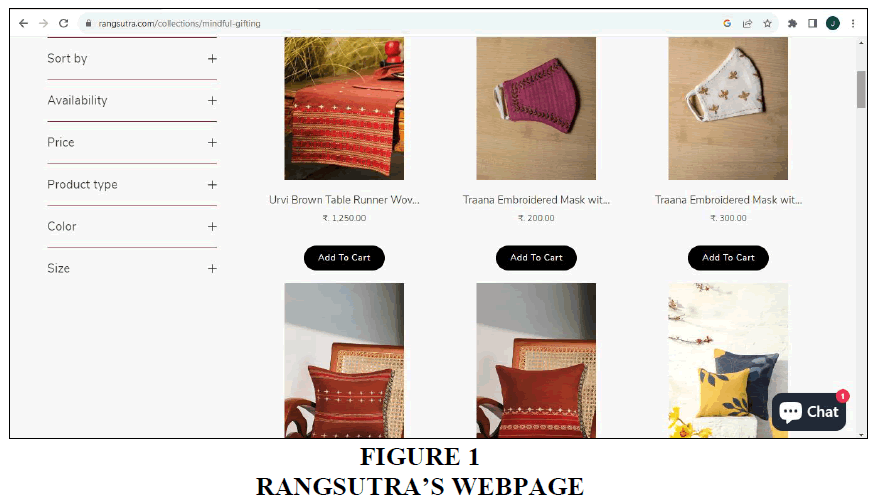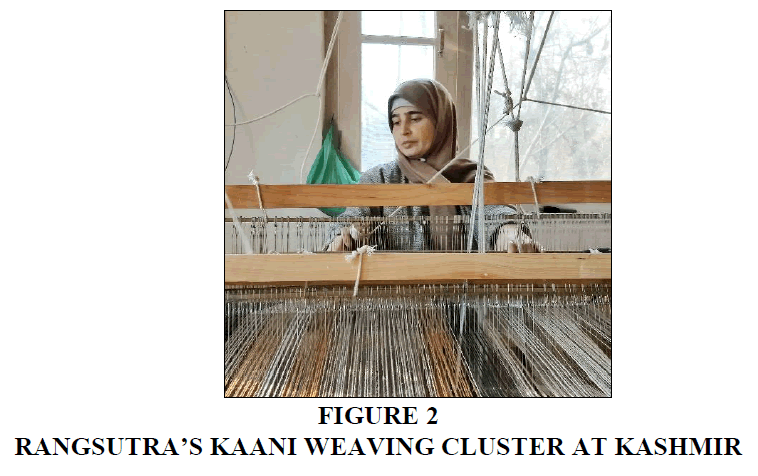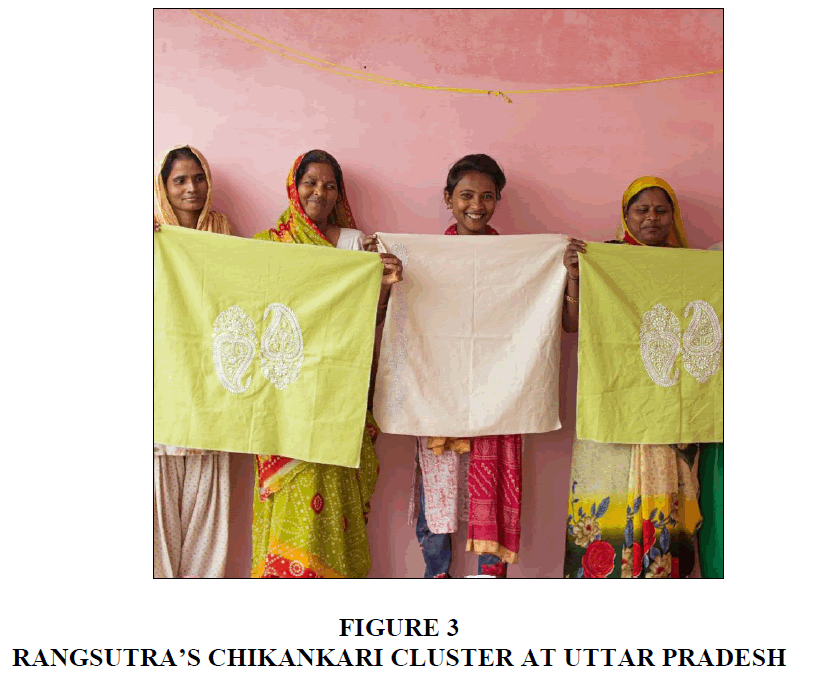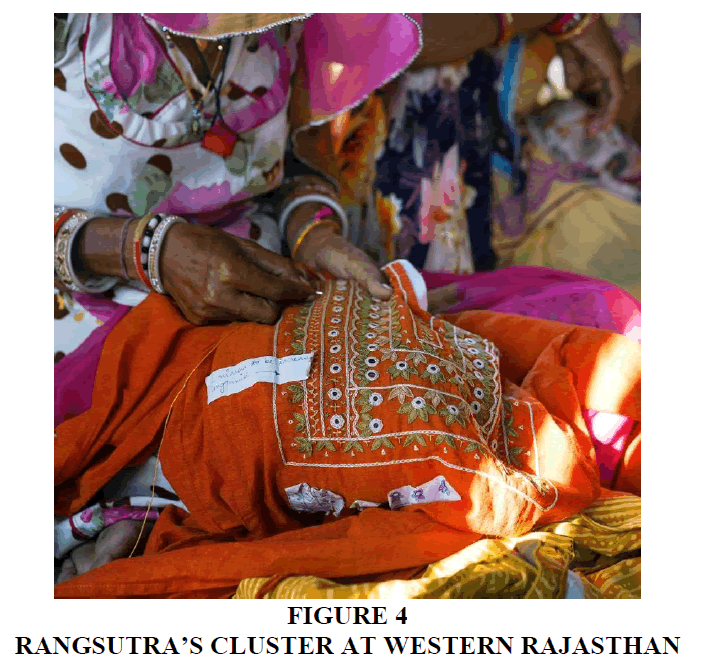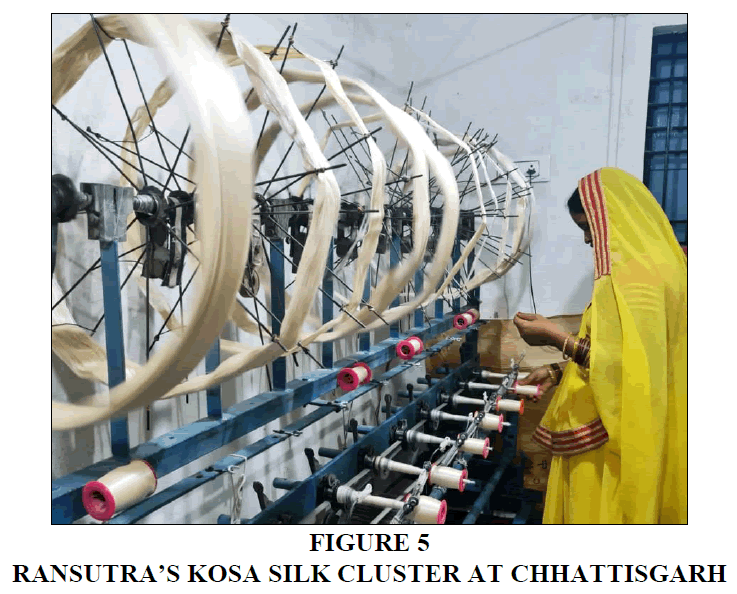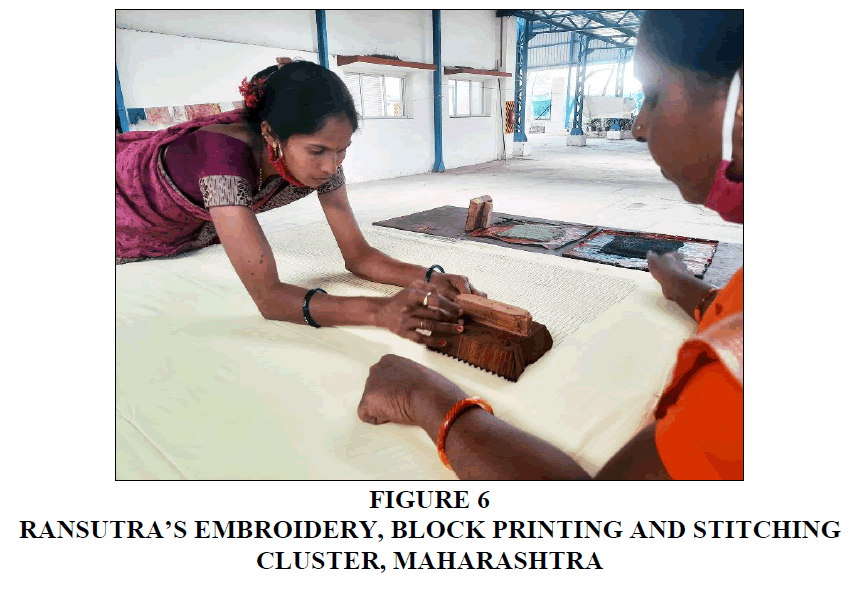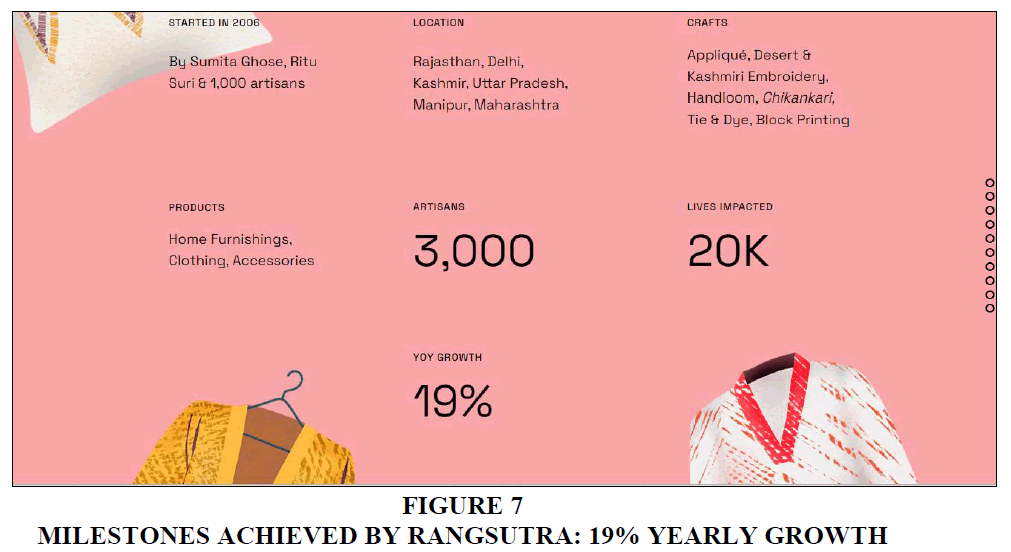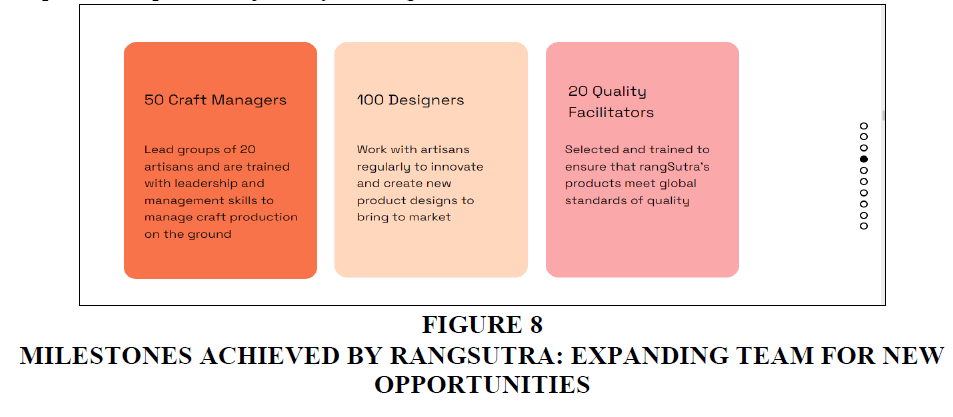Research Article: 2024 Vol: 28 Issue: 2
Bridging Profit and Purpose through Social Entrepreneurship: The Case of Rangsutra Crafts India
Jolly Masih, BMU Munjal University, Gurugram
Ashish Sharma, 1+Entrepreneur in Sustainability & Healthcare
Innovation, New Brunswick, NJ, USA
Citation Information: Masih, J., & Sharma, A. (2024) Bridging profit and purpose through social entrepreneurship: the case of rangsutra crafts india. Academy of Marketing Studies Journal, 28(2), 1-9.
Abstract
Social entrepreneurship is a rising trend where entrepreneurs prioritize social and environmental impact alongside profits. In today's changing world, traditional business models are being redefined by social entrepreneurs who tackle challenges like poverty and inequality. RangSutra Crafts India, founded by Sumita Ghose in 2006, has transformed the Indian handicraft sector, merging heritage craftsmanship with modern design. This case study explores the successful partnership between RangSutra and FabIndia, showcasing how RangSutra's ethical practices and innovative model align with FabIndia's mission to preserve indigenous crafts while empowering artisans with sustainable livelihoods. It reveals the key factors driving their success, challenges faced, and valuable lessons for similar collaborations. Social entrepreneurship emerges as a powerful force fostering positive change and sustainable solutions.
Introduction
Social Entrepreneurship: A Driver of Change n Global Market
Social entrepreneurship involves utilizing entrepreneurial strategies to devise innovative solutions for social, cultural, or environmental challenges, aiming for both financial success and tangible impact. Unlike conventional businesses fixated on profits, social entrepreneurs balance profitability and purpose.
Examples like RangSutra Crafts showcase this concept by empowering rural artisans, particularly women, providing equitable pay, skill enhancement, and access to global markets, thereby elevating livelihoods, preserving traditions, and advancing gender parity. TOMS Shoes epitomizes the "One for One" model, where every sale triggers a donation of shoes, eyewear, or clean water, underscoring business's potential for positive transformation. Grameen Bank, founded by Nobel laureate Muhammad Yunus, pioneered microfinance, granting small loans for impoverished individuals to initiate businesses, igniting a global trend in poverty alleviation initiatives.
Social entrepreneurship effectively addresses unmet needs by targeting marginalized areas overlooked by conventional business and government. By focusing on prevalent societal and environmental concerns, social entrepreneurs drive innovation, inspiring novel solutions. Their success stories inspire individuals to merge personal passions with social impact, catalyzing change within communities. Moreover, social entrepreneurs challenge norms and advocate policy changes, instigating far-reaching systemic transformations that enhance society's well-being according to Bhalerao et al. (2022).
The Humble Beginning of A Social Entreprise: Ransutra
RangSutra Crafts India exemplifies social entrepreneurship at its finest. Founded in 2006 with modest capital, the company has evolved into a unique handmade crafts venture, uniting over 2,000 artisans across India-see Figure 1.
Its core mission of empowering rural artisans and fostering sustainable livelihoods has been unwavering as per Kumar and Kalse (2021). Through fair trade practices and equitable treatment, RCIL empowers artisans, nurturing their prosperity and preserving traditional craft skills. The partnership between artisans and investors reflects the ethos of 'Respect for All,' forging a path of collaboration and collective success. Notably, FabIndia's significant procurement of RCIL's products speaks to the enterprise's impactful journey, now boasting an impressive Rs 8 crore turnover.
Objectives of the Case
Study Social Impact: Analyze how RangSutra Crafts' social entrepreneurship model creates positive social change, focusing on artisan empowerment, gender equality, and community development.
Examine Business Sustainability: Evaluate the viability of RangSutra's business model, exploring how it ensures long-term artisan welfare, ethical practices, and market relevance.
Draw Lessons for Others: Extract insights from RangSutra's success and challenges to provide valuable lessons for organizations seeking to engage in impactful social entrepreneurship initiatives.
Methodology
This case study is based on a combination of primary and secondary data sources, including interviews with key stakeholders from RangSutra and FabIndia, field visits, financial reports, and publicly available information. The qualitative data is analyzed using a thematic approach to identify patterns and insights as suggested in studies by Masih and Rajasekaran (2020).
Collaboration Dynamics and Partnership Foundation
RangSutra and FabIndia's partnership revolves around the supply of handcrafted apparel and textiles produced by rural artisans Figure 2.
RangSutra acts as an intermediary, bridging the gap between artisans and the market as suggest by Nidhi et al. (2017). The collaboration involves multiple stages, including design development, production, quality control, and distribution. FabIndia provides design inputs and market insights, while RangSutra ensures the execution of designs while maintaining the authenticity of traditional techniques. The partnership between RangSutra and FabIndia was established in 2010. FabIndia recognized the potential of RangSutra's skilled artisans and the authentic craftsmanship they offered Figure 3.
Though RangSutra works with producer units, they function independently. “We have strong design and market linkages through FabIndia. The designs are given by us and the units create the fabrics,” says Ghose. One unit creates the fabric, while another does the embroidery and yet another comes out with the final output as suggest by Masih et al. (2020).
Fabindia & Rangsurta Partnership Expanded the Horizon for Social Entrepreneurship in India
In June 2022, Shrimayee (RangSutra’s E-commerce and Marketing Manager), had stated in an interview that “RangSutra, which had largely focused on its B2B vertical and had forged significant partnerships with companies like IKEA and FabIndia, aimed to strengthen its B2C operations and consistently improve the sustainability of its production process.” The success of the RangSutra-FabIndia partnership was attributed to several key factors:
Supply Chain Integration and Ethical Practices: FabIndia's involvement in integrating RangSutra's supply chain showcased a vital aspect of social entrepreneurship. By ensuring a seamless flow of products from artisans to retail outlets, both partners maintained their commitment to ethical sourcing, quality, and timely delivery, aligning with the principles of responsible business practices as reported by Megha et al. (2021).
Empowerment and Socio-Economic Growth: The partnership's core, empowering rural artisans, vividly embodies the essence of social entrepreneurship. Offering fair wages, skill development, and sustainable income, RangSutra uplifted artisans economically while preserving traditional crafts. This empowerment not only enhanced their livelihoods but also contributed to wider socio-economic development, echoing the transformative impact social entrepreneurship can achieve-see Figure 4.
Taggu Devi, who has been working as a craft manager at the Barmer centre for four years, says “I earn around Rs 6,000 a month after working for eight hours a day. I come to the centre to work. There are 60 artisans at my centre. I was trained by RangSutra and now I teach younger members. I wish to learn more and develop new skills.”
Market Expansion and Inclusive Reach: The collaboration's profound impact on market reach highlights its social entrepreneurship dimension. FabIndia's extensive retail network extended RangSutra's market presence, showcasing the potential of partnerships to enhance artisans' incomes and opportunities. This expansion exemplified how social entrepreneurship can catalyze inclusive growth, propelling rural communities into broader markets.
Preservation of Culture and Impact: The collaboration's impact in preserving traditional crafts emphasizes the inherent cultural preservation aspect of social entrepreneurship. By promoting age-old techniques and practices, RangSutra and FabIndia played a role in safeguarding cultural heritage. This preservation, along with its associated social and economic benefits, exemplifies how social entrepreneurship contributes to holistic community development.
Artisan Empowerment and Gender Equality: The partnership's impact on artisans transcends mere economic enhancement, showcasing social entrepreneurship's dedication to gender equality. Through entrepreneurial skills, RangSutra empowered women artisans, challenging socio-cultural norms. This exemplifies social entrepreneurship's potential in breaking barriers and fostering inclusivity.
Sustainable Impact and Economic Upliftment: The partnership's enduring impact on artisan livelihoods attests to social entrepreneurship's role in sustainable economic upliftment. Access to broader markets resulted in increased demand for artisans' products, translating to improved incomes and heightened social standing within communities. This sustainability aligns with social entrepreneurship's objective of creating lasting positive change.
How Rangsutra Prepared Rural Articians to Cater the Demands of Global High-Class Fashion Customers of Fabindia?
The organization recognized that these artisans possessed invaluable skills in various traditional crafts, including embroidery, weaving, and block printing. RangSutra's first step was to provide training and skill enhancement, enabling artisans to produce high-quality and marketable products:
Design Innovation: To make traditional crafts relevant in modern times, RangSutra introduced design innovation. The enterprise collaborated with designers to create contemporary products that incorporated traditional techniques. This fusion of heritage craftsmanship with modern aesthetics gave rise to a unique product range that appealed to a broader consumer base.
Entrepreneurial Training: RangSutra's approach went beyond skill development. Artisans were educated in business management, financial literacy, and marketing strategies. This training equipped artisans, especially women, with the knowledge and confidence to manage their own enterprises.
Creating Clusters of artisans in different locations: RangSutra empowers rural artisans by creating clusters that foster skill development, market access, and sustainable livelihoods. These artisan communities, spanning diverse crafts like weaving, embroidery, and block printing, benefit from training, design innovation, and direct consumer linkages. By nurturing these clusters, RangSutra strengthens traditional craftsmanship, provides economic opportunities, and preserves cultural heritage, propelling artisans towards self-sufficiency and global recognition-see Figure 5.
Market Access: RangSutra addressed the challenge of market access by establishing direct linkages between artisans and consumers. By eliminating intermediaries, artisans received fair compensation for their work, and consumers gained access to authentic, ethically produced crafts. This approach not only empowered artisans economically but also helped revive the demand.
Women's Empowerment: RangSutra's focus on women artisans played a pivotal role in transforming communities Figure 6.
As women gained financial independence, they became decision-makers within their families and communities, leading to improved social status and gender dynamics. Kamala Devi, an artisan at RangSutra stated “the best thing about working for RangSutra is getting the right price for her work. While earlier Kamala would earn only Rs 200-300 a month, working with local vendors, now she makes around Rs 3,000 a month.”
Sustainability: RangSutra's model emphasized sustainable practices, both environmentally and economically. By utilizing locally sourced materials and eco-friendly production methods, the enterprise minimized its ecological footprint while supporting local economies-Figure 7.
Challenges and Future Directions
The successful collaboration between RangSutra Crafts and its partners has brought significant achievements in empowering artisans and driving socio-economic progress. However, various challenges have persisted, underlining the essence of social entrepreneurship in their journey-see Figure 8.
Supply chain management, consistent quality, and scaling while preserving artisanal essence have been ongoing challenges. Exploring e-commerce and digital platforms for wider customer outreach and integrating sustainable practices could enhance the partnership's social and environmental impact as suggested by Patil and Kumar (2021). RangSutra faced fluctuations in market demand and competition from cheaper alternatives, impacting sales and artisans' income. Accessing niche and international markets proved challenging, hindering scalability and economic growth for artisans. Balancing financial sustainability, fair wages, and quality products required strategic management.
Adopting technological advancements, constant skills upgrading, empowering women artisans, and procuring quality raw materials were integral to staying competitive as reported by Yaja and Kumar (2021). Navigating government policies and regulations in the handicraft sector added complexity, necessitating adherence to ethical practices. Maintaining artisan inclusivity and community coherence while expanding further exemplified the commitment of social entrepreneurship in ensuring equitable benefits for all artisans. Despite these challenges, RangSutra's dedication to empowering rural artisans remains steadfast, driving positive change in the lives of its stakeholders.
The Road Ahead: Rangsutra’s Transition from Fabindia’s Supplier to a Successful Social Entrepreneur
Since 2011, RangSutra has been weaving the principles of social entrepreneurship into its growth trajectory. The emphasis on product development workshops and the assumption of complete operational control, from design to marketing, during its 10th year underscore RangSutra's commitment to sustainable impact and innovation. Recognizing the legal complexities of being a public limited company, RangSutra sought iProbono's guidance to embark on a transformative journey. This shift towards becoming an independent non-profit entity reflected the essence of social entrepreneurship, as it aimed to attract vital funds and delineate social initiatives like cluster development from purely commercial endeavors. The strategic pursuit of an optimal structural framework with legal advice illustrated RangSutra's dedication to aligning its operations with the principles of social entrepreneurship, reinforcing its mission to empower artisans, drive community development, and uphold ethical business practices.
In an interview in 2022, RangSutra founder Sumita Ghose stated “I walked into the small home of Dhanni Bai, one of our artisans, in a village in Rajasthan. I saw something that moved me greatly. She had framed her RangSutra share certificate and put it up on the wall next to the pictures of elders. When I asked her why she had done this, she said that the house was in her husband’s name and their farm in her father-in-law’s name. This was the only thing in her name.” They encapsulate what the social enterprise means to its 2,000 rural artisan shareholders. It is not just a constant source of livelihood, but also empowerment.
According to Sumita, COVID impacted them less because they were operating in rural areas. “We became digitally savvy to keep in touch with each other and the artisans. We also kept connecting with artisans on phone. The district collectors asked us to make large quantities of masks. So, that kept us busy. The B2B orders were not cancelled but deferred. Our major global buyer also gave us the grant to help support the artisans.”
In year 2022, the enterprise had an annual sales turnover of Rs 26 crore and is aiming for Rs 30 crore 2023. On the road ahead, Sumita says: “We are moving eastwards. We have started working in Jharkhand with bamboo artisans. That is a new and different kind of initiative. We want to work in Chhattisgarh and Jharkhand on crafting garments made of Kosa and Tussar silk. We want to revive the work we were doing in Manipur” (Figures 5-8). Shrimayee, the E-commerce and Marketing Manager, chipped in to add that “RangSutra envisions itself as a social enterprise which recognises that people and the planet are the planks on which sustainable profit must be mounted. A proactive effort in including women in the economic structure could perhaps help weed out the inherent gender bias”.
Conclusion
Social entrepreneurship represents a paradigm shift in the way we perceive and approach business. It challenges the notion that profit, and societal betterment are mutually exclusive, demonstrating that businesses can be a force for good. RangSutra Crafts, founded in 2006, redefines India's handicrafts sector, empowering rural artisans sustainably. Amidst persistent challenges, it exemplifies social entrepreneurship's potency in addressing societal issues. This case study explores RangSutra's partnership with FabIndia, famed for handcrafted products. The study unveils shared values underpinning their success and examines challenges, like supply chain logistics. Lessons extracted emphasize shared values, transparency, and trust as pivotal. Social entrepreneurship, epitomizing meaningful impact alongside profit, transforms industries and empowers marginalized communities. RangSutra Crafts showcases business's potential for positive change, forging an equitable, sustainable future globally.
References
Bhalerao, K., Kumar, A., Kumar, A., & Pujari, P. (2022). A study of barriers and benefits of artificial intelligence adoption in small and medium enterprise. Academy of Marketing Studies Journal, 26, 1-6.
Kumar, A., & Kalse, A. (2021). WITHDRAWN: Usage and adoption of artificial intelligence in SMEs.
Indexed at, Google Scholar, Cross Ref
Masih, J., & Rajasekaran, R. (2020). Integrating big data practices in agriculture. IoT and Analytics for Agriculture, 1-26.
Masih, J., Rajsekaran, R., Govinda, K., Saini, N., & Sharma, M. (2020). Study Of Emotional Analysis About Pandemic Situation During Covid Era Editorial And Social Media. Biomedical Journal of Scientific & Technical Research, 31(5), 24548-24556.
Masih, J., Sharma, M., & Rajasekaran, R. (2021). COVID-19 Impact on Indian food and hospitality sector with specific reference to potato crop. Journal of Management Information and Decision Sciences, 24, 1-16.
Megha, S., Ramesh, D. C., & Jolly, M. (2021). Facebook Advertising in the Era of Digital Economy. In European, Asian, Middle Eastern, North African Conference on Management & Information Systems (pp. 97-108). Cham: Springer International Publishing.
Nidhi, R., Jolly, M., & Gadhe, S. (2017). Study of Agri-Clinics & Agri-Business Centres for Improving Women Farmers’ Access to Extension Services in Agriculture. Indian Journal of Extension Education, 53(3), 67-71.
Patil, D. V., & Kumar, M. A. (2021). A viewpoint on digital marketing and usage of social media tools during covid-19 pandemic. Academy of Marketing Studies Journal.
Yaja, M., & Kumar, A. (2021). An empirical study of marketing of SMEs in the tourism sector. Small Enterprise Research, 28(3), 314-328.
Received: 09-Aug-2023, Manuscript No. AMSJ-23-13867; Editor assigned: 11-Aug-2023, PreQC No. AMSJ-23-13867(PQ); Reviewed: 29-Sep-2023, QC No. AMSJ-23-13867; Revised: 20-Dec-2023, Manuscript No. AMSJ-23-13867(R); Published: 07-Jan-2024
